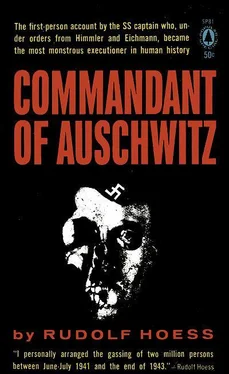During the first night, on the road near Leobschütz, I constantly came upon the bodies of prisoners who had just been shot, and which were therefore still bleeding. On one occasion, as I stopped my car by a dead body, I heard revolver shots quite near. I ran toward the sound, and saw a soldier in the act of stopping his motorcycle and shooting a prisoner leaning against a tree. I shouted at him, asking him what he thought he was doing, and what harm the prisoner had done him. He laughed impertinently in my face, and asked me what I proposed to do about it. I drew my pistol and shot him forthwith. He was a sergeant major in the air force.
Every now and then I also met officers from Auschwitz, who had managed somehow or other to get hold of a vehicle, I posted them at crossroads to collect these wandering columns of prisoners, and move them westward, eventually perhaps by train. I saw open coal trucks, loaded with frozen corpses, whole trainloads of prisoners who had been shunted onto open sidings and left there without food or shelter. Then again there were groups of prisoners, often without guards, who had escaped or whose guards had simply vanished. They too were making their way peacefully westward. I also met unaccompanied British prisoners of war doing the same: they were determined on no account to fall into the hands of the Russians. I saw SS men and prisoners huddled together on the refugees’ vehicles. I came upon columns of construction workers and agricultural laborers. No one knew where he was trying to go. Gross-Rosen was the final destination of them all. There was deep snow at the time and it was very cold. The roads were blocked by army and air force columns, and by the crowds of refugees. The slippery surface caused innumerable car accidents.
Beside the roads were not only dead prisoners, but also refugees, women and children. Outside one village I saw a woman sitting on a tree stump and singing to her child as she rocked it in her arms. The child had been dead for a long time and the. woman was mad. Many women struggled through the snow pushing baby carriages stacked high with their belongings. They had only one aim, to get away and not fall into the hands of the Russians.
Gross-Rosen was crammed to overflowing. Schmauser had already arranged for it to be evacuated. [97]
I traveled to Breslau to tell him what was happening and to urge him to stop the evacuation. He showed me the radio message from the Reichsführer SS which made him responsible for seeing that not a single healthy prisoner remained in any camp under his authority.
At the railroad station in Gross-Rosen the transports coming in were immediately sent on. Only the smallest ones could be fed. Gross-Rosen itself had no more food.
Dead SS men lay peacefully in the open cars between dead prisoners. Those still alive sat on top of them, chewing their piece of bread. Terrible scenes, best not described.
I lived through the evacuation of Sachsenhausen and of Ravensbrück. The scenes were the same here. By good fortune it was warmer and dry, so the columns could sleep in the open. But after two or three days there was no food left. The Red Cross helped by distributing food parcels. There was no more food to be found in the villages, through which columns of refugees had been passing for weeks on end. In addition there was the constant menace of low-flying planes, which systematically shot up every road.
Until the very end I tried my utmost to bring some order into this chaos. But it was all in vain. We ourselves had to flee. Since the end of 1944 my family had been living in the immediate neighborhood of Ravensbrück. I was therefore able to take them with me when the Inspectorate of Concentration Camps moved himself. We went first of all toward the Darss, [98]then after two days we headed for Schleswig-Holstein. All this was in accordance with the orders of the Reichführer SS. What we were supposed to do for him, or what duties we were still intended to perform, we could not imagine. I had to look after Frau Eicke and her daughter and children, and several other families too, and see that they did not fall into the hands of the enemy. Our flight was a gruesome journey. We traveled by night, without lights, along roads crowded with vehicles moving bumper to bumper. I had to be constantly on the lookout to see that all our trucks remained together, for I was responsible for the whole column. Glücks and Maurer took another route, via Warnemunde. In Rostock two of my large trucks containing all the radio equipment broke down, and by the time they were repaired the enemy tanks had nabbed them. For days on end we scurried from one clump of trees to the next, for the enemy’s low-flying planes were continually machine-gunning this principal escape route.
In Wismar Keitel himself stood in the street, arresting deserters from the front. On the way we heard in a farmhouse that the Führer was dead.
When we heard this, my wife and I were simultaneously struck by the same thought: now we, too, must go! With the Führer gone, our world had gone. Was there any point in going on living? We would be pursued and persecuted wherever we went. We wanted to take poison. I had obtained some for my wife, lest she and the children fall alive into the hands of the Russians in the event of their making an unexpected advance.
Nevertheless, because of the children, we did not do this. For their sake we wanted to take on our own shoulders all that was coming. But we should have done it. I have always regretted it since. We would all have been spared a great deal, especially my wife and the children. How much more suffering will they have to endure? We were bound and fettered to that other world, and we should have disappeared with it.
After her flight, Frau Thomsen, who had been our children’s governess at Auschwitz, had gone to live with her mother at St. Michaelisdonn in Holstein. I now brought my family there. I had no idea at that time where we, the Concentration Camp Inspectorate, were to go. I took my eldest child along, as he wanted to stay with me, and we still hoped we might have some active role to play, even in the last unoccupied patch of Germany and in the final hours.
We reported for the last time at Flensburg, where the Reichsführer SS had withdrawn with other members of the government. There was no more talk of fighting. Every man for himself was now the order of the day. I shall never forget my last meeting with the Reichsführer SS. He was beaming and in the best of spirits; yet the world, our world, had crumbled beneath our feet. He said: “Well, gentlemen, this is the end. You know what you now have to do.” So far I understood him, since these words were in accordance with what he had been preaching to the SS for years. Self-sacrifice for the ideal. But then he gave us his last order: hide in the, army!
Such was our farewell message from the man to whom I had looked up so respectfully, in whom I had had such implicit trust, whose orders and utterances had been gospel to me.
Maurer and I looked at each other in dumb astonishment. Our thoughts were identical. We were both veteran Nazis and SS officers, and had grown up in our ideals. Had we been alone, we would have committed some act of despair. But we had to look after our department chiefs, the officers and men of our staff, and our poor families.
Glücks was already half dead. We carried him to the naval hospital under another name. Gebhardt took charge of the women and children with the intention of getting them to Denmark. [99]
The rest of the departmental staff were issued with false papers that would enable them to vanish into the navy. I myself, under the name of boatswain’s mate Franz Lang, went to the island of Sylt, with orders to report to the Naval Intelligence School there. I sent my son back to my wife, along with my driver and car.
Читать дальше












